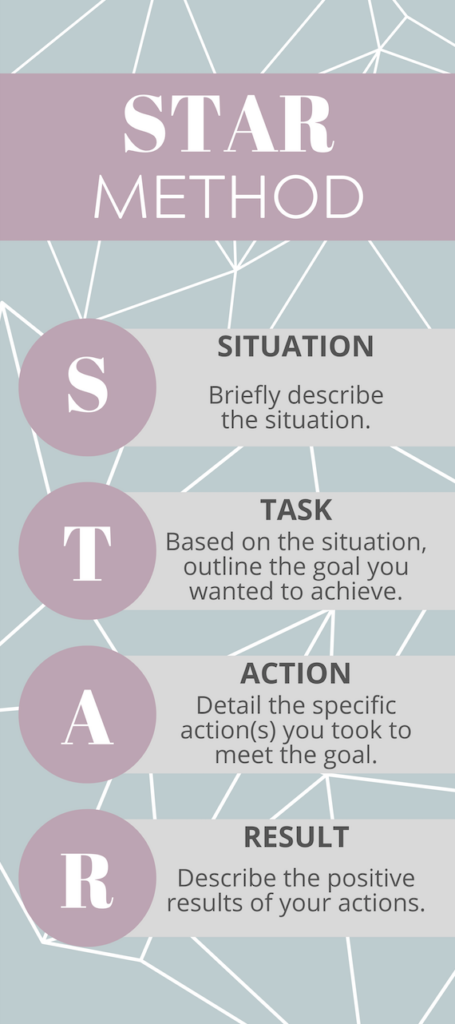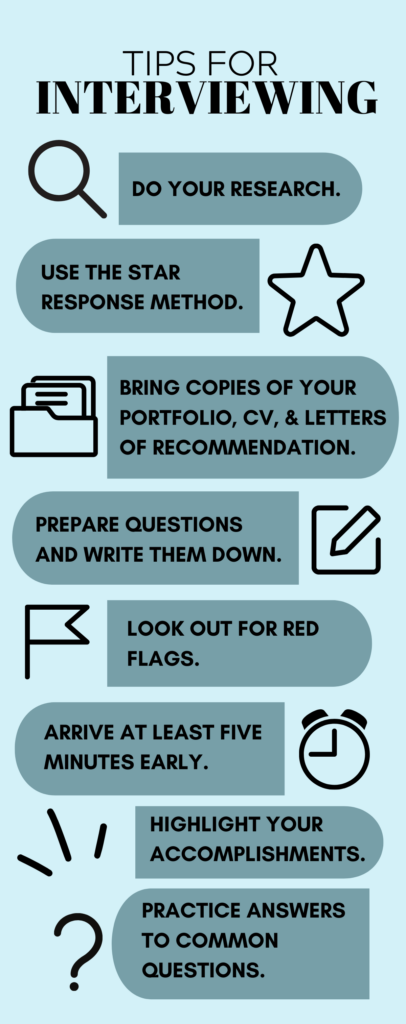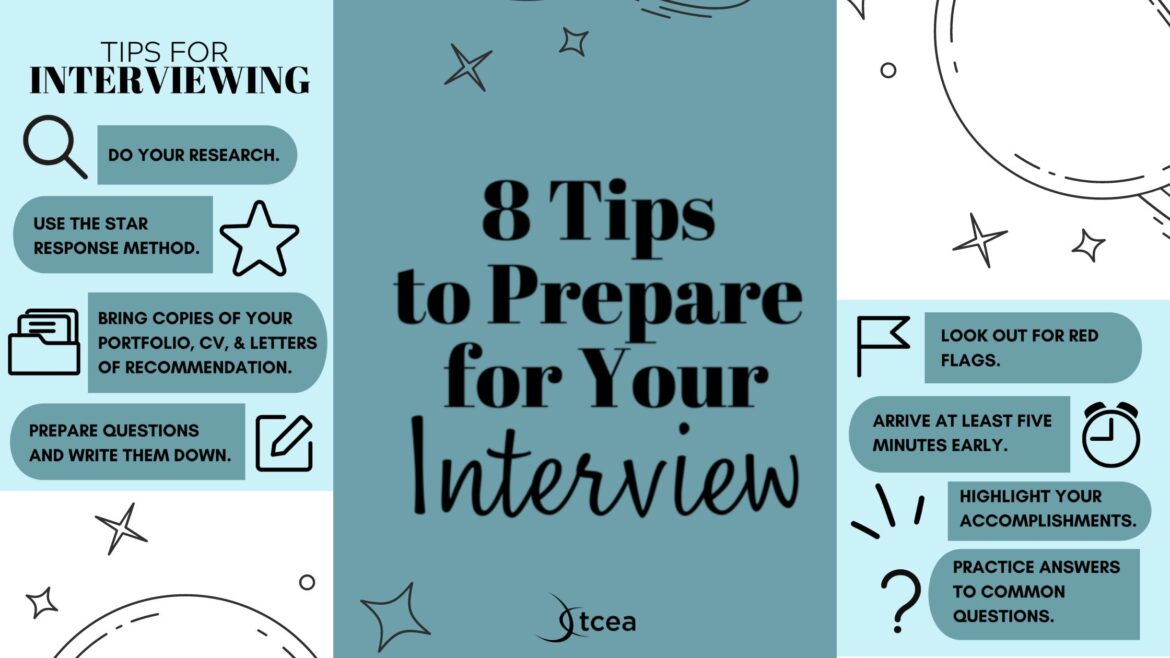So you got the interview. Congratulations! The period between the application submission and hearing back about an interview can be grueling. But waiting and preparing for that interview is perhaps the most grueling part of the whole process (next to waiting to know if you got the job, of course). The interview isn’t just a time for interviewers to get to know you and your experience. It’s also a time for you to get to know them and learn about your potential new place of employment. Let’s look at some ways to prepare for and make the most of your interview.
1. Do your research.
Get to know the school or district’s website and study the job description in advance. These are guides for questions that may be asked and will give you insight into what they’re looking for. I was always impressed when a candidate knew the mission and vision, special programs offered, public data, etc. of the school. But in addition to researching the school or district, if you can, research school ratings from both parents and employees. Are teachers happy at this school? Are parents? What does the academic performance and growth look like? The school performance data will also give you insight into some of the instructional questions that may be asked.
2. Use the STAR response method.
STAR stands for situation, task (goal), action, and result. This is a great way to prepare for questions on everything from differentiation, test results, and behavior management, to parent relationships, conflict resolution, and more. If you’re asked about an example of a behavior management practice you put in place, you can respond using STAR. Here’s an example:
Situation: “I had a group of five girls in my 5th grade class who struggled with minor conflicts multiple times a day. These students needed continuous guidance from me, and it was disruptive to the other students, took up their valuable recess time, and impeded instruction.”
Task: “My goal was for the girls to discern which conflicts merited teacher involvement, to gain skills and confidence in resolving minor conflicts, and to successfully reach resolutions on their own when appropriate.”
Action: “We had a conference and talked about healthy and unhealthy ways to handle conflict. We did some role-playing to practice healthy conflict resolution. We also talked about examples of conflicts that should most definitely be taken to the teacher and examples of conflicts that could be managed by the girls themselves. I made a colorful choice wheel with healthy conflict resolution options. I gave each girl a copy of the choice wheel, and we determined a few spots where it would be helpful to hang (restroom, classroom, playground, etc.) for easy reference when needed.”
Result: “With some time and practice, these students independently used the choice wheel for small conflicts. It began to foster a sense of pride, autonomy, and self-trust. Instead of coming to me with problems, they began to come to me saying, “Guess what? We just used ‘I feel’ statements, and we solved the problem, apologized, and got to play more at recess! We did it ourselves!” Not only that, but they started to help other students through conflicts and became leaders in this area. By the end of the year, they didn’t need the visual tool at all anymore.”

3. Bring a portfolio, copies of your resume, and any letters of recommendation.
Having these items on hand to pass out at your interview is essential. It shows that you have stellar preparation skills and that you show up ready. Showcasing a small portfolio that you can leave with the interview(s) is a fantastic idea. Not only does a portfolio give the interviewers a visual representation of your work and abilities, but it can also be a point of reference for you as you answer questions. For example, if they ask you a question about reading instruction, it’s great to be able to flip to a ready-made reading lesson with examples of student work and/or progress. It can also make you more memorable, especially if there is a large pool of candidates.
4. Prepare some questions in advance. (Write them down!)
Yes, that’s right. Write those questions down! Nerves can affect memory, and you want to be sure that all of your questions are answered. After all, an interview goes two ways. Usually, an interviewer will ask you if you have any questions, and it doesn’t hurt one bit to say, “Actually, I do. I wrote a few down here.” It shows that you’re serious about the job and you, too, want to ensure it’s a good fit both ways. Asking questions to give you insight into how you’ll be valued and supported is important– so is asking questions about the day-to-day (schedule, parent communication expectations, etc.) and work-life boundaries.
5. Be on the lookout for red flags.
Red flags can be vital to recognize because they often signify deeper issues such as bias, ageism, sexism, racism, lack of training, dysfunction, negative culture, etc. Illegal questions about marital status, age (How old are you? What year were you born?), religion (Do you practice a religion?), health (Do you have any health problems we should know about?), children (Do you have any/want to have kids? Are you pregnant?), race, disability (Do you have a disability?), gender (What gender do you identify as?), and sexual orientation are not acceptable.
These types of questions during an interview are big, huge, flying, scarlet flags. You are not obligated to answer any such questions. Here is some information on illegal versus legal interview questions to look over. In addition to this, are your questions being answered directly? Do the answers align with your values and expectations? How do the interviewers speak of current or past employees? Don’t be afraid to ask follow-up questions if something feels amiss, and trust your gut.
6. Arrive at least five minutes early.
Look up your travel route (if applicable) and be prepared to arrive early. Have your outfit picked, your papers printed, and be ready to get there at least five minutes early. Showing up late is not a good look (unless there is a valid reason) and should be avoided at all costs. If you need to reschedule an interview, make sure there is a good reason and that you contact the interviewer to make this request as much in advance as possible. If you get another offer or decide not to pursue the opportunity, respectfully contact the employer to cancel the interview.
7. It’s ok to highlight your accomplishments.
It’s not bragging to talk about what you’ve accomplished. You’ve worked hard, you’ve put in a lot of hours, and you’ve achieved a lot. During an interview, it’s your time to shine. How do your accomplishments align with the job, and why do they make you the best candidate? Your achievements show that you work hard, you get results, and you’re resilient. It’s 100% appropriate to highlight this in your interview but always bring it back to the skills, qualities, and experiences that make you right for the job.
8. Practice answers to those common interview questions.
Get that two-minute elevator pitch ready! It’s not easy to “sell yourself,” but when the inevitable, “So, tell us about yourself.” comes up, you want to be ready for it with a solid answer that doesn’t include your pets, family history, favorite foods, or hobbies. All joking aside, here is a recent list of the Top 20 Interview Questions with Sample Answers that I find very helpful.
Remember the STAR method for answering questions can be your best friend. Additionally, some of the best advice I received when I was interviewing was, when asked about weakness, be honest and add in what you’re doing to improve. For example, if one of your weaknesses is a lack of knowledge in Google tools, add in there that you’ve already enrolled in several of TCEA’s Google Workspace for Education Courses to show that you’re proactive. Here are some additional education-related questions to be prepared for.
Do you have additional tips to add to this list? Add them in the comments!


